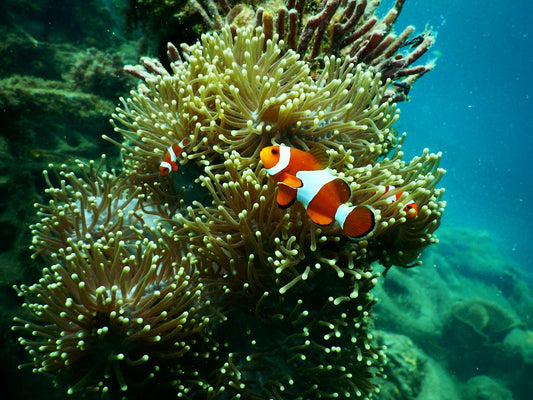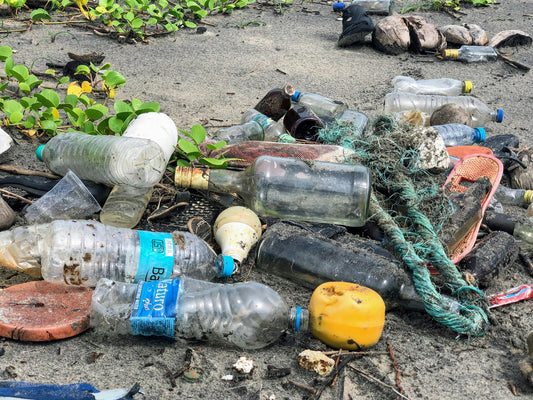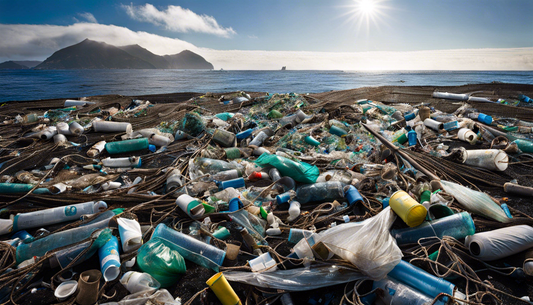Share
Plastic pollution is currently the most crucial environmental issue next to global warming, arousing a great deal of concern among nations globally. As a result, they are now in the process of reconsidering their ties with this material.
The goal of plastic-free behavior is not just about our personal actions but also about the bigger picture of protecting the health of our planet and ensuring the future of our generation.
To tackle this existential threat, countries are taking bold actions that lead to a freeing from the plastic strangle.
The only effective strategy for dealing with plastic pollution is implementing plastic-free initiatives.
In fact, countries that fully welcome such policies will not only address environmental hazards but also serve as a reference for other nations to follow.
In this article, we look into the challenges and achievements of the countries that tried to get rid of plastic pollution and are now heading towards a plastic-free future.
How Single-Use Plastics Pollute The Environment?

Once lauded as a unique material for its numerous and easy-to-use properties, plastic has become a source of a wave of environmental consequences.
From the massive strands of plastic residue polluting our oceans to microplastics that have infiltrated our food chain, the impact of plastic pollution is undeniable.
Entanglement and ingestion are harmful to all marine life, disrupting ecosystems and causing human health risks.
The toxic chemicals that are leached from plastic products can cause a number of health risks in humans and animals.
From plastic bags to straws, bottles, and packaging, these disposable objects are meant to be used once and last forever, with the environment being the innocent victim.
The Persistence of Plastic Pollution:
One-use plastic takes outstandingly long to break down in the environment, lasting decades or even centuries.
Unlike organic materials which decay naturally in time, plastics degrade into tiny fragments, known as microplastics, and they get deposited in soil, water bodies, and even air that people breathe.

Impact on Marine Life:
The most visible and heartbreaking outcome of single-use plastics is their effect on marine creatures.
Seabirds, sea turtles, dolphins, and more marine animals caught up in the debris take plastic for food which leads to ingestion and entanglement. It is estimated that at least 300,000 marine animals die each year from direct effects of plastic pollution.
Plastic ingestions leads to internal injuries, obstructions, and death of animals, hence directly threatening the survival of these species.
Furthermore, discarded fishing devices, including nets and lines, can last for long after their primary use and contribute to the problem by trapping and entangling marine life.
Pollution of Terrestrial Ecosystems:
While single-use plastics create big issues in the land as well as marine ecosystems, plastic pollution in oceans is usually put under the spotlight.
Plastic waste is littered on the land and in soil, posing a threat to ecology as the chemicals leach out and natural processes are disturbed.
How Are Countries Worldwide Contributing To Fight Plastic Pollution?

In the global struggle against plastic waste, several countries have made pioneering efforts to ban the use of plastic bags. More than 30 nations in Africa have adopted plastic bag restrictions, while the rest of the continent has implemented charges to curb the use of such bags.
Let’s take Rwanda, which introduced a ban on plastic in 2008. This was the first country to introduce a complete ban, and the fine for every violation was $60. Since then, the country has become known as a global role model for sustainability.
Next in line is Kenya. In 2017, Kenya implemented a strict plastic bag policy that banned the use of plastic bags in the country. The ban included the manufacturing, use, and import of plastic bags.
Violation penalties include imprisonment for a period not less than four years or a fine not less than $40,000.
Other than the Africian countries, California was the first state in the U. S to ban the use of plastic bags and this led to the adoption of 311 local bag ordinances in 24 states in 2014.
China has also progressed, having prohibited single-use plastic bags and utensils in key cities and single-use straws across the country in 2021.
Policies against plastic pollution are in place all over the world and they show how the right state interference can make a difference.
The following countries provide great global role models for the archetypes how countries successfully tackle plastic pollution.
Take Action Now! Never buy a plastic cleaner bottle again with our cleaning essentials kit and powerful cleaning tablets.
Countries Leading the Fight Against Plastic Pollution
Iceland and Sweden

Iceland and Sweden have been in the leading place in terms of environmental sustainability. These countries have used policy instruments pertaining to the reduction of plastic consumption and wastefulness.
In Iceland, the 'Plastic-Free Island' campaign has gained popularity, such as encouraging an alternative to single-use plastics as well as engaging the community.
In addition, the waste management system and the circular economy rules that Sweden employs have greatly reduced the amount of plastic that ends up harming the environment.
Rwanda

Rwanda is a shining example as the first ever country in the world to claim the title of 'plastic-free', attaining it in 2008 merely through a plastic bags and plastic packaging ban.
The government strictly enforces its ban, and those found in possession of plastic products pay the penalty.
In order to combat this problem, customs officers check all vehicles for plastic bags and confiscate them from tourists at the airport.
Rwanda's goal of eradicating plastic pollution is highlighted by its role as the head of the High Ambition Coalition, working towards a Global Agreement to Eliminate Plastic Pollution by 2040.
Palau

Palau has done a great deal of work to reduce plastic pollution utilizing its Plastic Bag Use Reduction Act which does not allow plastic bags to be distributed and prohibits import of plastic bag products.
Furthermore, Palau has implemented a zero disposable plastic policy through which it has banned disposable plastic and polystyrene beverage containers in all government properties.
The nation has also set regulations against burning plastic waste in the open air so that the emission of toxins and greenhouse gases that may affect the atmosphere can be stopped.
What should other countries learn?
The countries mentioned above have set an example that fighting plastic pollution is possible and anyone can do it.
There is still a dire need for other big countries in the world to take strict measures to stop plastic production. By following the right strategies, we can play our part in making our planet plastic free. `
Who is responsible to fight plastic pollution? Governments, Business, or Consumers? Feel free to leave a comment below.
We hope you enjoyed this article. If you want to read more like this, make sure to check out our Blog and follow us on Instagram. If you are interested in truly sustainable products, check out our Shop.









3 comments
Thanks for reaching out, Pamela!
We’ve contacted you via email and are happy to provide more information :-)
Can y9ou provide scientific prooof that your products are 100% plastic free>
Mujhe acha nahi lagta sochkar ki aaj tak main bhi plastic ka use karta hua aaya hun aur mere ghar mein aaj bhi hota hai main jab se jaana hun kuch dino phle ye sab ki plastic humare liye aur humari prakrati maa ke liye kitni buri hai main kuch revolution karna chahta hun mujhe samajh nahi aa raha main kaha se shuru karun